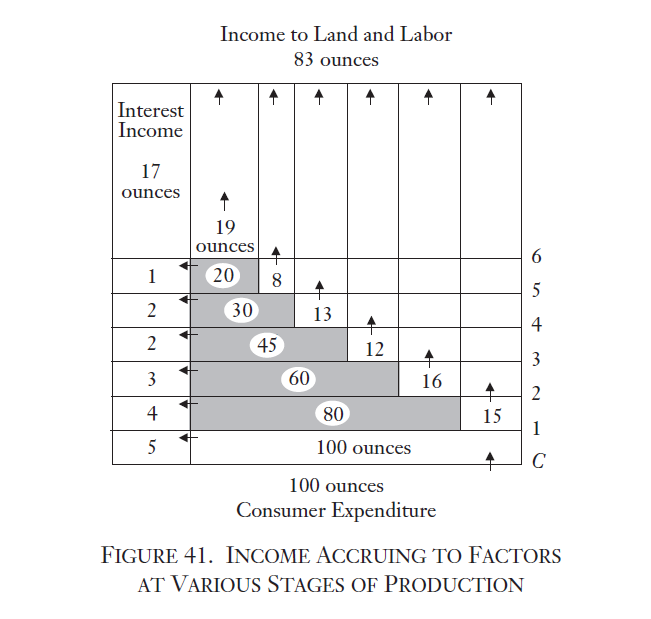A belief still commonly held today by not just Marxists and socialists, but progressives of many stripes, is the insistence that employers are “stealing” part of their workers’ labor because the wage workers receive from their employer are less than the contribution of their labor to the final value (i.e., selling price) of the finished good. Profit to the employer, the argument goes, is akin to theft from the workers. Profit is “surplus value” created by the worker but taken by the capitalist, they say. This surplus value represents an exploitative “wage theft” of sorts, and, importantly, is an exploitation that would not exist under a socialist economic system, according to their argument. But in his 1891 book The Positive Theory of Capital, Eugen von
Topics:
Bradley Thomas considers the following as important: 6b) Mises.org, Featured, newsletter
This could be interesting, too:
Nachrichten Ticker - www.finanzen.ch writes Die Performance der Kryptowährungen in KW 9: Das hat sich bei Bitcoin, Ether & Co. getan
Nachrichten Ticker - www.finanzen.ch writes Wer verbirgt sich hinter der Ethereum-Technologie?
Martin Hartmann writes Eine Analyse nach den Lehren von Milton Friedman
Marc Chandler writes March 2025 Monthly
 A belief still commonly held today by not just Marxists and socialists, but progressives of many stripes, is the insistence that employers are “stealing” part of their workers’ labor because the wage workers receive from their employer are less than the contribution of their labor to the final value (i.e., selling price) of the finished good.
A belief still commonly held today by not just Marxists and socialists, but progressives of many stripes, is the insistence that employers are “stealing” part of their workers’ labor because the wage workers receive from their employer are less than the contribution of their labor to the final value (i.e., selling price) of the finished good.
Profit to the employer, the argument goes, is akin to theft from the workers. Profit is “surplus value” created by the worker but taken by the capitalist, they say.
This surplus value represents an exploitative “wage theft” of sorts, and, importantly, is an exploitation that would not exist under a socialist economic system, according to their argument.
But in his 1891 book The Positive Theory of Capital, Eugen von Böhm-Bawerk reveals that even a system of state-owned means of production would not eradicate such “surplus value.”
Capital and Interest
For sake of clarity, it is critical to understand that what Marxists refer to as “surplus value”—or what is otherwise commonly referred to as “profit”—Böhm-Bawerk identifies as interest.
Interest, as recognized by the Austrian school, is the difference in value between present and future goods. Other things held equal, goods of like wants satisfaction are more highly valued in the present relative to the future. People will place a higher value on, say, receiving a car today relative to a promise to receive the same vehicle five years from now.
Similarly, this time preference explains why people are willing to repay, for instance, $105 back to the bank in one year’s time in exchange for receiving $100 today.
Böhm-Bawerk applies this insight on interest to the capitalist’s “profit” on his investment in productive resources like land, labor, and capital goods.
As he would describe it, the capitalist invests present goods (money) in exchange for future goods (the revenue he receives from the sale of the finished goods). More specifically, the capitalist’s money is invested in the labor, land, and capital goods utilized to create the finished products at some future date.
To better understand why this is important, it may be easier to conceive of the transaction between workers and capitalists like a loan. For instance, the capitalist, via his investment, “lends” a sum of money today to workers in the form of wages. The capitalist, as “lender,” is then paid back at a future date, but not directly from the worker’s wallet. Instead, he’s paid back from the income he receives when selling the finished product resulting from the worker’s labor.
If the income received from the finished products is larger than the money invested in labor, the difference is considered interest, as Böhm-Bawerk describes.
Conversely, the workers are like “borrowers” in a loan situation. They receive money now with a promise to “pay back” the loan in the future, except the repayment is in the form of the future finished products created by their labor.
Marxists and progressives, however, would argue that this interest represents an exploitative surplus value when it comes to the portion of the capitalists’ investment dedicated to labor.
If a worker is paid, say, $20 today for his labor which contributed to $25 of the final sale price of the finished good, that worker was shortchanged by the $5 difference by the capitalist, they’d argue.
To rectify this unjust worker exploitation, the socialists would say, society would need to abolish the private ownership over the means of production. Instead, the state would own the means of production, and in turn the exploitative “surplus value” taken by the capitalists would be eradicated.
Interest under Socialism
Böhm-Bawerk’s work, however, systematically demonstrates that so-called surplus value would not be eliminated under socialism—rather it would be shifted from capitalists to the state.
As a starting point, Böhm-Bawerk points out that even under state-owned means of production, present goods and future goods would not be treated as having equal value, because, as he wrote, the “difference in value between present goods and future is an elementary economic phenomenon independent of any human arrangements.” Changing the economic system won’t change that basic fact.
He continues by exploring how the situation would play out under socialism: “The Socialist state, as possessing all means of production, gets all the citizens to work in its factories, and pays them a wage. It conducts, therefore, on the largest scale the buying—forbidden to private individuals—of future good Labour.”
In calling labor a “future good,” Böhm-Bawerk refers to the finished goods that come to completion at a future date resulting from labor, and therefore representing future income to the socialist state paying the wage.
“Now, on technical grounds, various portions of the labour it buys it necessarily sets to work simultaneously towards various productive ends widely removed in point of time,” Böhm-Bawerk continues. “One group of laborers, for instance, it sets to baking; another it sets to sink mining shafts, which, perhaps, assist in turning out consumption goods only twenty years later; another it sets to replant a forest.”
“Now how much can and should the Socialist state pay as wage to those workers whose labour it directs to those far-away but productive ends?” Böhm-Bawerk asks. In other words, would the “interest” on investments in labor be the same for long-term ”loans” to workers as it would for short-term “loans”?
Imagine if the socialist state attempted to eliminate the phenomena of interest in their mission to eliminate exploitative worker “surplus.”
Workers like foresters devoted to more remote finished goods would be greatly advantaged over those devoted to more immediate ends. It would result in foresters being paid the “full value” today for the product of their labor sold a hundred years from now, whereas bakers are receiving full value today for the product of their labor sold in one day’s time.
It would be like the foresters being paid 2120 wages today while bakers have to accept 2020 wages. Clearly, there would be major incentive and rewards for workers to enter lines of work dedicated to products that won’t ripen into finished products until far into the future.
As a result, Böhm-Bawerk wrote, “If the entrance to individual branches of employment were left free to all comers, everybody would be a forester and nobody would bake bread; the country would relapse to primeval forest; and the present, with its pressing needs, would remain unprovided for.”
In order to avoid such a situation, the socialist state would need to utilize the same method of discounting wages as capitalists do.
“But if the foresters are paid exactly like bakers at 4 dollars per day, they are exploited just as they are by the capitalist undertakers under the present system,” Böhm-Bawerk wrote. “In buying the future commodity, labour, an agio is put on present goods, and the labourer, instead of his future product of $100, is put off with a present wage of $4, which represents the present value of the planted saplings. But the surplus value which these saplings take on as they grow into oak trees ready for cutting, the Socialist commonwealth puts into its pocket as real interest.”
But wouldn’t the socialist state, in the ever-present mission for “equality,” make workers whole by redistributing the funds back to them?
“It is, too, well worthy of remark that an equal distribution of the interest obtained by the Socialist state does not establish the same economic conditions as if the interest had not been taken at all,” Böhm-Bawerk answers. “In this distribution it is not the persons whose labour and product the interest was due that get the interest, but entirely different people.”
For instance, the forester whose oak obtains $100 a hundred years in the future but is paid $4 in wages today yields a “surplus” of $96. Say the state evenly divides the interest it collects in the production process by giving all workers an additional $2. The forester is still far from being made whole, according to the Marxist theory of “surplus value.”
“Thus we come to a very remarkable and noteworthy result,” Böhm-Bawerk announces. “Interest, which today the Socialists abuse as a gain got by exploitation, a robbery from the products of labor, would not disappear even in the Socialist state, but would remain, in promise and potency, as between the community organized under Socialism and its labourers, and must so remain.”
Böhm-Bawerk concludes decisively that, contra Marx, “interest is not an accidental ‘historico-legal’ category, which makes its appearance only in our individualist and capitalist society, and will vanish with it.”
Instead, interest is “an economic category, which springs from elementary economic causes, and therefore, without distinction of social organization and legislation, makes its appearance wherever there is an exchange between present and future goods.”
In sum, Böhm-Bawerk dismantles the view that a system of state-owned means of production will eliminate the “exploitation” of workers’ “surplus value” that so forcefully animates Marxist ideology.
Tags: Featured,newsletter








